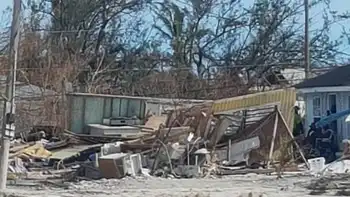Regulators approve Wisconsin utility's wind farm
The Minnesota Public Utilities Commission said Wisconsin Power & Light Co.'s project can be built just north of Albert Lea in Freeborn County. The utility received a permit for a 200-megawatt wind farm, the first phase of what officials hope will eventually become a 400-megawatt project.
The first phase would generate enough energy to power 50,000 homes.
A group of local residents had asked the commission to delay any decision until proceedings on a Minnesota Department of Health report were complete. The report, called a white paper, was a review of research into how wind turbines could affect the health of people living near them. Public comments are being accepted on the report through October 14.
"Because of this Department of Health study, it would be premature to issue any kind of permit," Carol Overland, an attorney for Safe Wind in Freeborn County, told commissioners.
Overland also asked for a minimum 1,500-foot distance between wind turbines and homes. Minnesota's current setback requirement for wind turbines is 500 feet plus whatever distance is needed to meet the state's noise standards. Wisconsin Power & Light has agreed on a 1,000-foot minimum setback for landowners participating in and receiving money from the project. For those not participating, the setback would likely be a few hundred feet more.
"Our project meets all of the state requirements and exceeds many of the requirements," Arshia Javaherian, who represented Alliant Energy, Wisconsin Power & Light's parent company, told the commission. He urged the commission to grant the project a certificate of need and site permit, saying the utility has addressed all issues that have come up during the process, which has taken more than a year.
The five-member commission voted unanimously to approve the project, reserving the right to alter the site permit if issues arise later.
"As we go forward with the proceedings on the Health Department's white paper, if information came forward that there were significant health impacts... the permit could be modified," commissioner Phyllis Reha said.
Wisconsin Power & Light already has received regulatory approval in Wisconsin for the project, so the Minnesota approval means the utility can move forward with its plans. The project will help the utility meet renewable energy requirements set by Wisconsin.
However, two electric consumer groups in Wisconsin are challenging that state's regulatory approval of the project. The total cost of both phases of the project would be about $500 million, with about $91.7 million recovered by increases in electric and natural gas rates the utility wants to impose next year.
Safe Wind in Freeborn County will soon decide if it will ask the Minnesota PUC to reconsider the matter.
Overland said the fact that commissioners felt it necessary to include Wisconsin Power & Light's promise of 1,000-foot minimum setbacks in the site permit rather than going with the state standard "reflects there are issues that need to be addressed."
Katie Troe, organizer for Safe Wind in Freeborn County, said the PUC's decision was disappointing. Troe and others believe wind turbine noise can cause stress and lack of sleep, leading to health concerns, and she said many landowners sign contracts with wind energy companies without being aware of the risks.
"Nobody knows about it. They don't even realize what's happening," she said. "It comes on so slowly."
Related News

Maritime Electric team works on cleanup in Turks and Caicos
TORONTO - Maritime Electric has sent a crew to help in the clean up and power restoration of Turks and Caicos after the Caribbean island was hit by Hurricane Irma.
They arrived earlier this week and are working on removing debris and equipment so when supplies arrive, power can be brought back online.
Fortis Inc., the parent company for Maritime Electric operates a utility in Turks and Caicos.
Kim Griffin, spokesperson for Maritime Electric, said there are over 1000 poles that were brought down by the storm.
"It's really an intense storm recovery," she said. 'Good spirits'
The crew is working with less heavy equipment…





